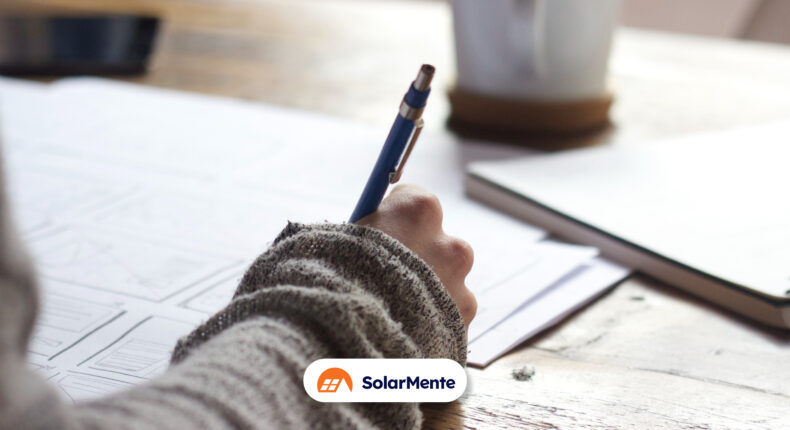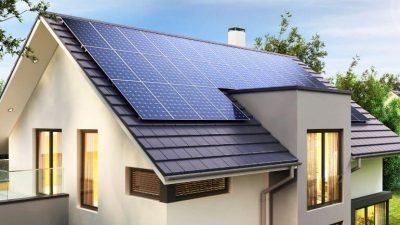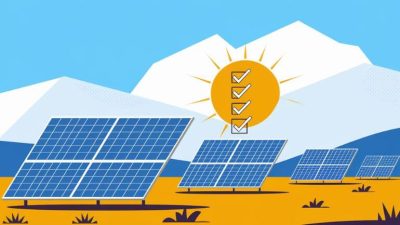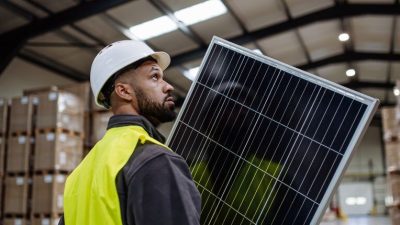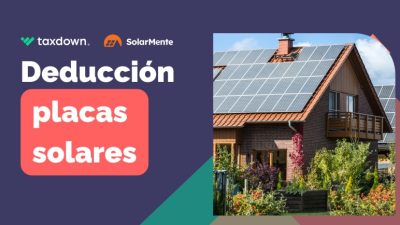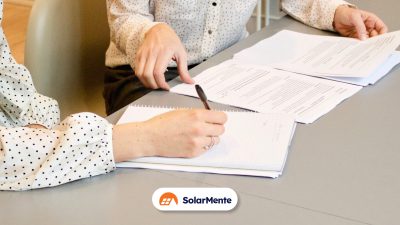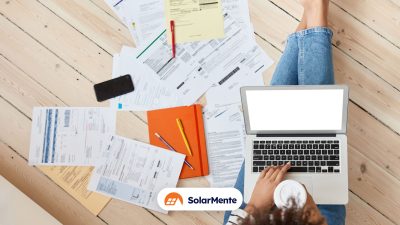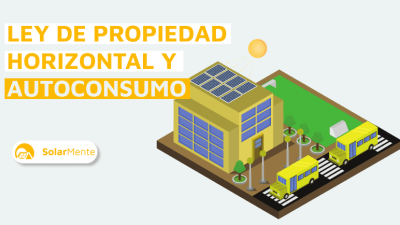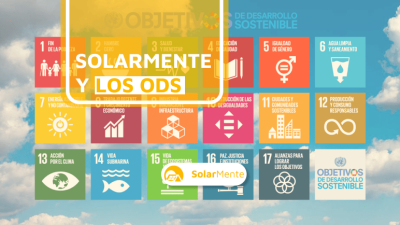The installation of solar panels requires detailed electrical and construction work.
Any photovoltaic system located on a building needs a series of essential permits or approvals at state, regional and local level in order to enjoy clean and economical energy.
These procedures have been simplified with the new regulations established in Royal Decree 244/2019, favouring the change towards self-consumption with reduced bureaucratic processes.
Permits to install solar panels are essential in order to legalise the system and ensure that they comply with electrical and building codes in the defined geographical area.
Having said all this, it is important to know:
- What are the permits for installing solar panels before installation?
- And after installation?
- Legalisation of a photovoltaic panel system
- Fines applicable for installing solar modules without authorisation
What permits are required to install solar panels?
We show you the following list with the main procedures you will need before and after the installation of your solar panels:
- The design of the photovoltaic installation
- Access and grid connection permits
- The building permit and local taxes
- Environmental or public utility authorisation
- Preliminary administrative and construction authorisation
- Installation and completion certificates
- Initial inspection and periodic inspections
- Operating authorisation (only necessary for the industrial sector)
- Registration of the self-consumption installation with the Ministry of Industry
- Access contract for the self-consumption installation
- Surplus compensation contract
- Energy supply contract for auxiliary services
- Representation contract
Once these are listed, let’s take a closer look at each of the permits.
Permits prior to the photovoltaic installation
Although this procedure is in the hands of the installation company, it is a good idea to be familiar with the administrative procedures for photovoltaic installations. In this way, you can be sure that the procedure is being complied with at all times, as established in Royal Decree 244/2019.
The design of the photovoltaic installation
The design of the system is required for all installations, but is the procedure the same whether we are talking about a home or an industry?
There is a variation depending on the purpose of use:
- In small self-consumption installations (less than 10 kW), the installer must at least have a technical report.
- For large systems, a project must be submitted.
Grid access and grid connection permits
If PV installations are built on non-urban land or exceed 15 kW and discharge excess electricity, grid access and grid connection permits must be applied for. In the latter instance, no matter if they are located on urban land, it will also be mandatory to apply for the permit.
All these procedures are carried out with the electricity supplier. After 10 days, the electricity company must respond. On the other hand, if the application has been refused, it will have to be justified and there will be 30 days to complain.
The building permit and local taxes
The building permit is a piece of paperwork that continues to cause a number of doubts. Do I need to complete this procedure to go ahead?
A few years ago, this document was compulsory throughout Spain, but what happened when there was a paradigm shift in legislation?
The autonomous governments wanted to avoid the delay caused by this procedure in order to speed up the process. Today, the only regions that require a building permit are Murcia and the Basque Country, as the following graph shows:
For example, some autonomous communities, such as Andalusia, request a Declaración Responsable or Comunicación Previa instead of a building permit to install solar panels.
This documentation is a simplified form, where the promoter declares that:
- The installation complies with current regulations
- Has the necessary technical report required by the legislation
- It undertakes to comply with the installation process for the duration of the work.
However, we must make a note in this regard: in large installations that require a higher power, if so established by the competent local council, they will have to submit the additional information requested.
On the other hand, in this same step, the Construction and Works Tax (ICIO) and the provision of urban development services must be paid.
You can also obtain ICIO and IBI rebates. The first tax allows a maximum deduction of 95% and the Real Estate Tax offers a compensation of up to 50% with a maximum of 30 years, depending on each municipality.
Environmental or public utility authorisation
Is environmental authorisation required in all cases?
According to the regulations, installations with less than 100 kWp are not obliged to present this procedure. But be careful with this because if the building is located in a protected area of the autonomous community, the latter may require the documentation.
Prior administrative authorisation and construction authorisation
For large-scale photovoltaic systems, administrative authorisation before and after installation is mandatory.
Therefore, small installations will be spared this procedure and those above 50 MWp will be obliged to carry out the authorisation with the relevant local council.
Permits after the installation of solar panels
Installation and completion certificates
This certificate must be presented to the corresponding autonomous community to ensure the correct execution of the work.
Depending on the size of the system, the permit must be submitted by different persons:
- For small installations (less than 10 kW), an electrician will issue the documentation.
- For installations larger than 10 kW, the responsibility for submitting the information lies with senior technicians.
Initial inspection and periodic inspections
The initial and periodic inspections are carried out by an institution called the Authorised Control Body (ACO). The latter are carried out every five years for low voltage plants.
However, they will only be mandatory for installations above 10 kW.
Inspections would only be necessary for small installations in crowded public places or damp premises. If you have any doubts about this, we advise you to contact your local council.
The operating permit
This procedure is not a compulsory permit for small systems, only if the technician has presented a work design.
To be more precise, it is a document that allows the use of the installation and is managed by each autonomous community. In this case, the administrative authorisation must be obtained in order to follow the procedure in order.
How to legalise a solar panel installation?
Once all the permits to install the solar panels have been obtained, it is time to legalise the system.
It does not matter if they are grid-connected, isolated, shared consumption or surplus discharge installations. All of them must be legalised.
Here you have the necessary steps for the legalisation of a photovoltaic system:
- Contract an authorised installer. All installations must be carried out by an authorised company in order to carry out the work correctly.
- Register the installation. It must be registered in the relevant autonomous community, presenting the necessary documentation for a correct registration such as the Electrical Bulletin or the Responsible Declaration, among others.
- Validate the system. The Ministry of Industry validates the installation or requests documentation from the installer, notifying the distributor in the geographical area.
- The grid access contract is signed for the compensation of surpluses. The distributor or the energy trading company will contact the consumer to execute the contract within 10 days.
You will therefore have this period available to express your agreement or disagreement to your company. If you have not responded within this period, the conditions of the contract will be taken as accepted.
You will not have to worry about the whole process. At SolarMente, we take care of requesting all the documentation required for a correct installation and we accompany you throughout the process to resolve all your doubts at every stage.
What fines and penalties are there for self-consumption installations?
An authorised installer is essential to legalise the self-consumption system. So far so good.
However, what happens if it is not done properly and are there penalties?
Legalising the installation is mandatory and breaking the law carries certain fines by the authorities that are reflected in Royal Decree 15/2018.
This document establishes a maximum penalty for non-compliance with current regulations between the higher of the following amounts:
- 10% of the annual turnover for electricity consumption.
- 10% of the billing for the energy discharged to the grid.
Fines for illegally installing solar panels have changed in recent years, where the amounts were up to 60 million euros depending on the case.
All your permits in order with SolarMente
Permits to install solar panels have been simplified since 2018 thanks to the paradigm shift in the self-consumption law.
Thanks to this, bureaucracy has been significantly reduced with the intention of advancing the installation process and enjoying the solar energy produced by our solar panels as soon as possible.
Although there is still a long way to go, the changes that have taken place over the last few years are encouraging the number of installations with a noticeable growth that we see reflected in both the residential and industrial sectors.
This information will help you understand the process from start to finish. At SolarMente, we take care of the paperwork to legalise the installation in the right way, always taking into account your circumstances. If you have answered all your questions in this article, write to us and we will help you get your permits in order.
Frequently asked questions
Do I have to apply for a building permit to install solar panels?
It is not compulsory to apply for a building permit, except for the autonomous communities of Murcia and the Basque Country.
How long does it take to legalise the installation once the installation has been executed and completed?
The time to legalise a photovoltaic installation is usually between 1 and 3 months. However, this figure varies from municipality to municipality and we should take these deadlines with a pinch of salt.
Can I install solar panels myself?
You cannot install solar panels on your own. You need an authorised installer for the photovoltaic system to be legalised. Otherwise, you could incur fines for not carrying out a proper installation.

